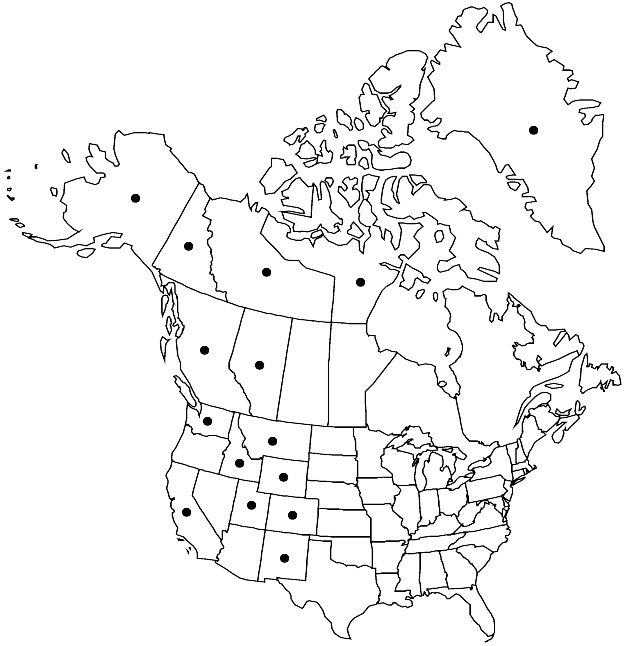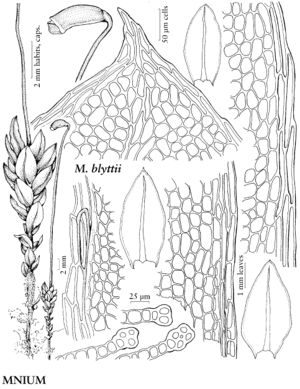Difference between revisions of "Mnium blyttii"
Bryol. Europ. 4: 208, plate 400. 1846.
FNA>Volume Importer |
imported>Volume Importer |
||
| (6 intermediate revisions by 2 users not shown) | |||
| Line 9: | Line 9: | ||
|special_status={{Treatment/ID/Special_status | |special_status={{Treatment/ID/Special_status | ||
|code=F | |code=F | ||
| − | |label= | + | |label=Illustrated |
}} | }} | ||
|basionyms= | |basionyms= | ||
| Line 27: | Line 27: | ||
|elevation=low to high elevations | |elevation=low to high elevations | ||
|distribution=Greenland;Alta.;B.C.;N.W.T.;Nunavut;Yukon;Alaska;Calif.;Colo.;Idaho;Mont.;N.Mex.;Utah;Wash.;Wyo.;Europe;Asia. | |distribution=Greenland;Alta.;B.C.;N.W.T.;Nunavut;Yukon;Alaska;Calif.;Colo.;Idaho;Mont.;N.Mex.;Utah;Wash.;Wyo.;Europe;Asia. | ||
| − | |discussion=<p>Collections of Mnium blyttii with weakly toothed or entire leaves are fairly common and can superficially be mistaken for Cinclidium or Rhizomnium. However, even though many leaves appear entire, some leaves will have small forward-pointing bumps at the distal ends of a few marginal cells. The border of linear cells, although not as distinct as with most species of Mnium, and the larger plant and leaf size readily separate well-developed specimens of M. blyttii from M. stellare, the only other species of Mnium that can produce a postmortal color in its laminal cells.</p> | + | |discussion=<p>Collections of <i>Mnium blyttii</i> with weakly toothed or entire leaves are fairly common and can superficially be mistaken for <i>Cinclidium</i> or <i>Rhizomnium</i>. However, even though many leaves appear entire, some leaves will have small forward-pointing bumps at the distal ends of a few marginal cells. The border of linear cells, although not as distinct as with most species of <i>Mnium</i>, and the larger plant and leaf size readily separate well-developed specimens of <i>M. blyttii</i> from <i>M. stellare</i>, the only other species of <i>Mnium</i> that can produce a postmortal color in its laminal cells.</p> |
|tables= | |tables= | ||
|references= | |references= | ||
| Line 36: | Line 36: | ||
-->{{#Taxon: | -->{{#Taxon: | ||
name=Mnium blyttii | name=Mnium blyttii | ||
| − | |||
|authority=Bruch & Schimper | |authority=Bruch & Schimper | ||
|rank=species | |rank=species | ||
| Line 50: | Line 49: | ||
|publication title=Bryol. Europ. | |publication title=Bryol. Europ. | ||
|publication year=1846 | |publication year=1846 | ||
| − | |special status= | + | |special status=Illustrated |
| − | |source xml=https:// | + | |source xml=https://bitbucket.org/aafc-mbb/fna-data-curation/src/2e0870ddd59836b60bcf96646a41e87ea5a5943a/coarse_grained_fna_xml/V28/V28_357.xml |
|genus=Mnium | |genus=Mnium | ||
|species=Mnium blyttii | |species=Mnium blyttii | ||
Latest revision as of 22:35, 5 November 2020
Plants (1–)2–5(–7) cm. Stems dark reddish brown. Leaves green to dark green, undulate or contorted and often somewhat twisted when dry, broadly ovate, elliptic, or ovate-elliptic, sometimes narrow, (2–)2.5–3.5(–4) mm; base short- to long-decurrent; margins sometimes reddish brown or brownish with age, 1-stratose or rarely 2-stratose in short sections, entire or weakly toothed distally, rarely to below mid leaf, teeth single or rarely paired, small, blunt, sometimes reduced to small extensions of distal cell ends; apex rounded-acute, acute, or obtuse, apiculate or sometimes cuspidate, cusp weakly toothed; costa subpercurrent, percurrent, or sometimes ending well before apex, distal abaxial surface smooth; medial laminal cells short-elongate or sometimes ± isodiametric and irregularly angular, (17–)20–35(–40) µm, slightly smaller towards margins, not in diagonal rows, sometimes in weakly defined longitudinal rows, weakly or not collenchymatous, blue postmortal color present in cells; marginal cells linear, in 1–2(–3) rows. Sexual condition dioicous. Seta single. Capsule yellow-brown, 3–5 mm; operculum conic-mammillate; exostome greenish yellow. Spores 17–22 µm.
Phenology: Capsules mature summer.
Habitat: Moist soil, humus, rock, shaded cliffs
Elevation: low to high elevations
Distribution

Greenland, Alta., B.C., N.W.T., Nunavut, Yukon, Alaska, Calif., Colo., Idaho, Mont., N.Mex., Utah, Wash., Wyo., Europe, Asia.
Discussion
Collections of Mnium blyttii with weakly toothed or entire leaves are fairly common and can superficially be mistaken for Cinclidium or Rhizomnium. However, even though many leaves appear entire, some leaves will have small forward-pointing bumps at the distal ends of a few marginal cells. The border of linear cells, although not as distinct as with most species of Mnium, and the larger plant and leaf size readily separate well-developed specimens of M. blyttii from M. stellare, the only other species of Mnium that can produce a postmortal color in its laminal cells.
Selected References
None.
